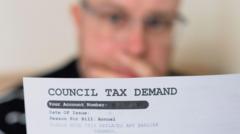Are Struggling Households Facing a Council Tax Crisis?

Understanding the Growing Crisis of Unpaid Council Tax in the UK
As household budgets continue to be strained by rising living costs, a significant number of families in the UK find themselves unable to keep up with their council tax payments. Recent figures reveal a staggering £6.6 billion owed to local authorities in England alone, with a further £642 million added to the unpaid debts in the last year. When combined with the outstanding amounts from Scotland and Wales, the total council tax arrears across the three countries have surpassed £8 billion. This alarming trend raises critical questions about the sustainability of the current council tax system, the impact on local services, and the need for reform in debt collection practices.
The Scale of the Problem
The £6.6 billion in unpaid council tax in England represents a significant burden on local authorities, which rely on these funds to deliver essential services. From waste collection to social care, the services funded by council tax are vital for community welfare. Understanding the causes of this growing debt is essential for addressing the issue effectively.
Rising Living Costs
One of the primary drivers of unpaid council tax is the ongoing rise in living costs. Inflation, higher energy prices, and stagnant wages have left many households struggling to make ends meet. As families prioritize essential expenses, council tax payments often become a lower priority.
Impact of the COVID-19 Pandemic
The pandemic has exacerbated financial difficulties for many households. Job losses, reduced working hours, and increased reliance on social security have all contributed to a rise in council tax arrears. As the economy slowly recovers, the lingering effects of the pandemic continue to impact household budgets.
Consequences of Unpaid Council Tax
Unpaid council tax not only affects local authorities but also has broader implications for communities. Here’s a look at some of the consequences:
Impact on Local Services
Local councils depend on council tax to fund a variety of services. When collections fall short, councils may be forced to cut back on essential services, impacting the quality of life for residents. This can lead to:
- Reduced funding for community programs
- Increased pressure on social services
- Cuts in public amenities like parks and libraries
Debt Collection Practices
As council tax arrears mount, local authorities often resort to aggressive debt collection practices, including the use of bailiffs. This approach can lead to further financial distress for struggling households. Campaigners are advocating for a more sympathetic approach to managing council tax debts, emphasizing the need for support rather than punishment.
Government Response to the Crisis
In response to the escalating crisis, the government is considering reforms to the way unpaid council tax is pursued. However, the Treasury is also planning for an annual council tax increase of up to 5%. This dual approach raises questions about the sustainability of the current system.
Potential Reforms
Proposed reforms to council tax debt collection practices include:
- Enhanced communication and support for those struggling to pay
- Flexible payment plans tailored to individual circumstances
- Limiting the use of bailiffs in cases of genuine hardship
Future Council Tax Increases
The decision to allow councils to raise council tax by 5% annually (or more with local approval) raises concerns about affordability for households already facing financial strain. While councils need to maintain funding for essential services, such increases may push more households into arrears.
What Can Households Do?
For households struggling with council tax payments, there are several steps that can be taken to mitigate the financial burden:
Understand Your Rights
Residents should be aware of their rights when it comes to council tax payments. Local councils are required to offer support to those in financial difficulty, and understanding these entitlements can empower households to seek assistance.
Explore Council Tax Reduction Schemes
Many local authorities offer council tax reduction schemes for low-income households. These programs can significantly reduce the amount owed, making payments more manageable.
Seek Financial Advice
Financial counseling services can provide valuable guidance for those struggling with debt. These services can help households make informed decisions about budgeting, prioritizing payments, and exploring available support.
Conclusion
The growing crisis of unpaid council tax is a multifaceted issue that requires urgent attention from both local authorities and the government. As households face increasing financial pressures, a compassionate approach to debt collection and a reevaluation of council tax policies are essential. By understanding the underlying causes and advocating for necessary reforms, we can work towards a fairer system that supports vulnerable families while ensuring the sustainability of local services.
As we move forward, it is crucial to consider how we can balance the needs of local authorities with the realities faced by struggling households. What changes do you think are necessary to create a more equitable council tax system? #CouncilTax #FinancialSupport #LocalAuthority
Frequently Asked Questions
What happens if I don’t pay my council tax?
If council tax payments are not made, local authorities may take a series of actions to recover the debt, including sending reminders, imposing fines, or sending bailiffs to collect the owed amount. It's important to communicate with the council if you are having difficulties paying.
Can I get help with paying my council tax?
Yes, many local councils offer support schemes for those struggling to pay their council tax. This may include reductions based on income or special circumstances. Contact your local council for more information.
What should I do if I’m facing bailiff action?
If you are facing bailiff action, it is crucial to seek advice immediately. You have rights, and there are organizations that can help you negotiate with bailiffs and understand your options.
Published: 2025-06-25 10:12:07 | Category: technology



